Utility CEOs contribute personal money to help Republicans; Utility PACs also favor GOP
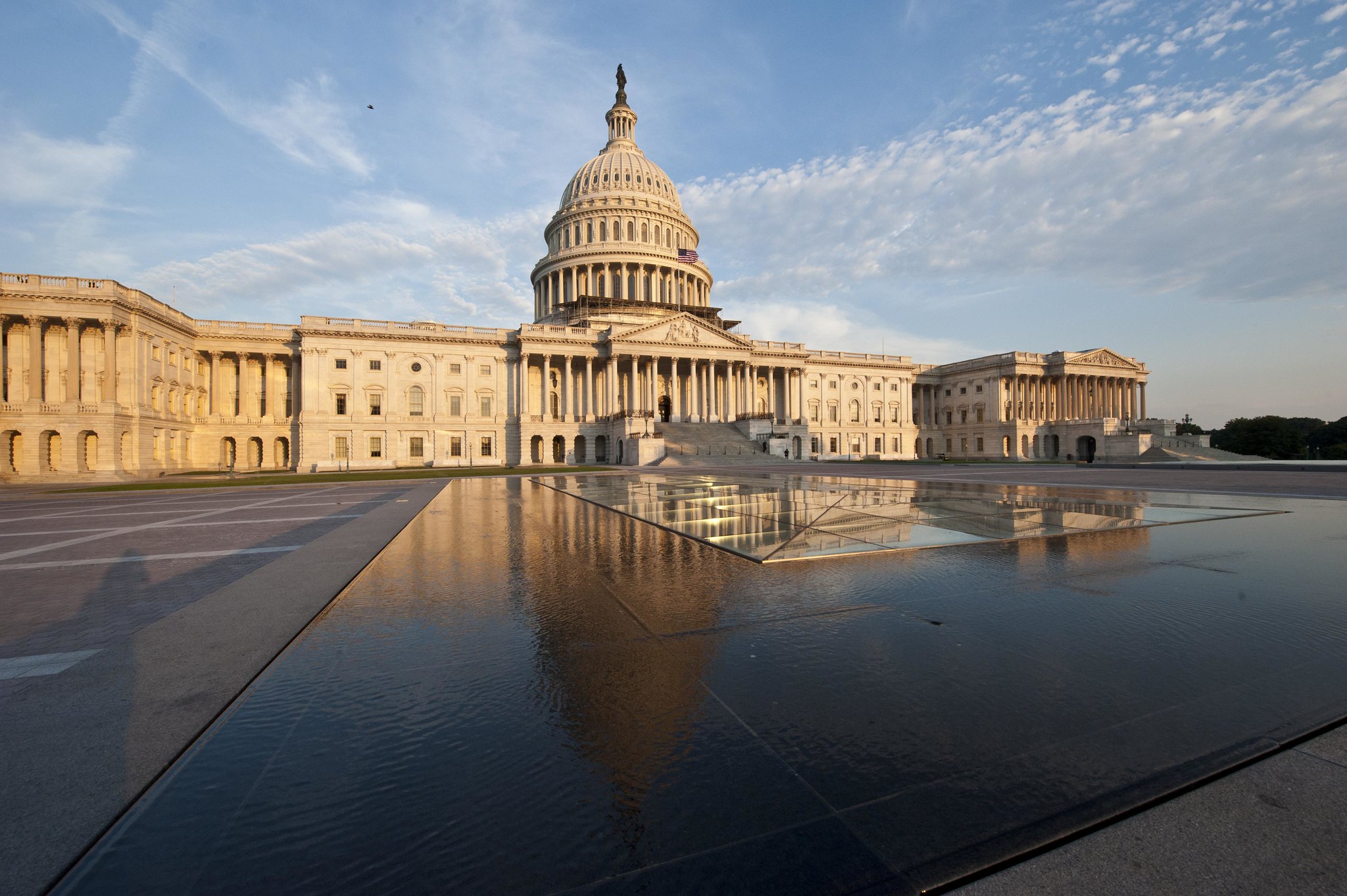
CEOs at some of the country’s largest utilities have spent hundreds of thousands of their own dollars this cycle to help Republicans maintain control of the U.S. Senate and to buoy Republicans’ electoral prospects in the House, according to an Energy and Policy Institute analysis of federal campaign contributions.
Utility political action committees (PACs) have also contributed more to Republican candidates running for federal positions and to the PACs that spend millions of dollars on the GOP’s behalf, according to the analysis. The utility PACs contributed to Republican candidates and PACs over Democratic candidates and PACs by about a 4:3 ratio.
The contributions come at a time when Democrats are looking to pass national energy and climate policy that seeks to cut greenhouse gas emissions from power companies. Joe Biden has promised as part of his campaign to invest $2 trillion in clean energy research and to put the country on a path that would achieve a carbon-free power sector by 2035, and ultimately reach economy-wide net-zero emissions by 2050. While some of the Biden campaign’s climate proposals can be accomplished through executive orders, other policies would likely depend on Democratic control of the Senate and House of Representatives. Senate Republicans hold a three-seat majority and will have to defend 23 seats this election, while Democrats are up for re-election in 12 states.
Utility CEO Contributions
Utility CEOs and board chairs have contributed $499,550 to various PACs that are working to elect Republican Senate and House candidates, compared to $65,900 to Democratic PACs, an 8:1 ratio.
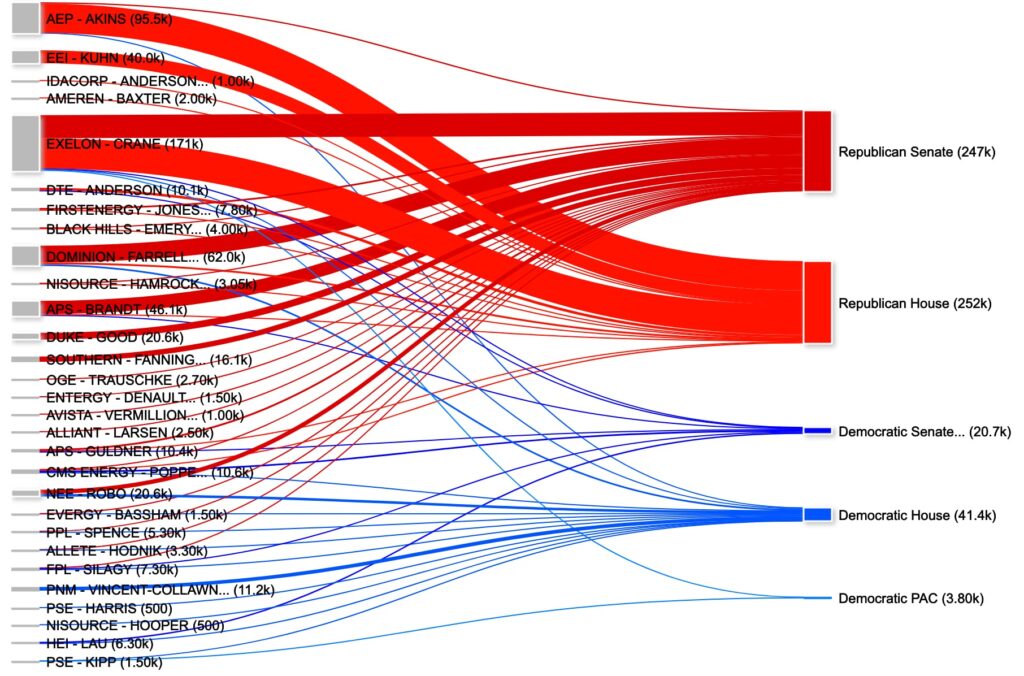
Exelon CEO and President Christopher Crane is the top contributor this campaign cycle to federal candidates and PACs (excluding CEO contributions to their respective company PACs). Despite leading a utility with subsidiaries in predominantly blue jurisdictions (the District of Columbia, Illinois, Maryland, New Jersey and Pennsylvania), Crane’s personal dollars are going to Republican campaigns. His most recent non-Exelon PAC contributions were in March and February and went to the National Republican Congressional Committee, National Republican Senatorial Committee, and the Abraham Lincoln PAC, which is affiliated with Representative Darin LaHood (R-Ill) and sends money to other Republican House members.


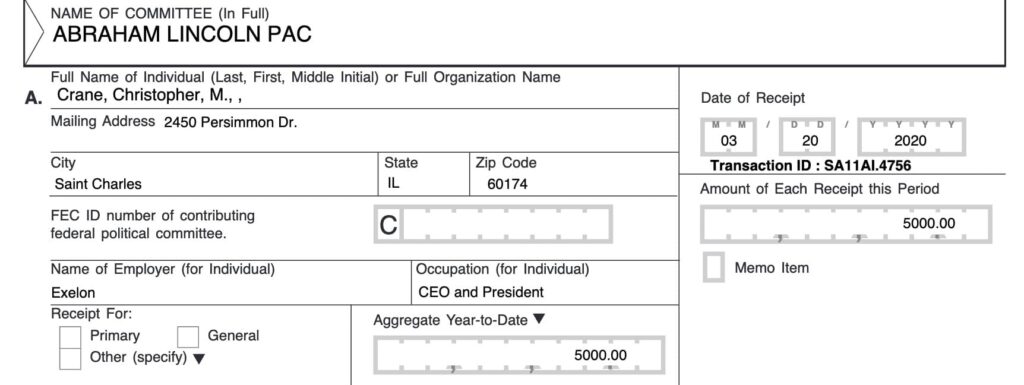
Crane has contributed a total of $170,550 this cycle, and with the exception of $2,800 to Representative Sean Casten (D-IL), $1,000 to Senator Dick Durbin (D-IL), and $2,800 to Cory 2020 (Senator Cory Booker’s presidential campaign committee), Crane’s money has gone to helping the GOP.
Crane was compensated a total of $15.4 million last year. The median employee total compensation at Exelon was $126,000.
American Electric Power (AEP) CEO Nick Akins is the second largest contributor among utility CEOs to date this cycle. That stands in contrast to AEP’s PAC giving, which was low for a utility of its size, as detailed below. Akins also has invested in Republicans this cycle. Of the $95,450 he contributed in 2019 and 2020, only $1,500 went to a Democrat – Joyce Beatty (D-OH). Akins gave $89,950 to House Republicans through the Take Back The House 2020 joint fundraising PAC, NRCC, or Rep. Kevin McCarthy’s (R-CA) and Rep. Steve Stivers’ (R-OH) direct campaigns. Akins also sent $2,500 to Sen. Susan Collins and $1,500 to Sen. Majority Leader Mitch McConnell this year.
Akins was compensated a total of $14.4 million last year; the median AEP employee compensation was $132,611.
Dominion Energy CEO Tom Farrell has been the third larger contributor of utility CEOs this cycle to date. Farrell’s $62,000 in federal contributions has mostly gone toward Republican Senate and House PACs, with the exception of $2,800 to Rep. Donald McEachin (D-VA) and $2,500 to Rep. Steny Hoyer (D-MD).
Farrell appeared to have made several glaring mistakes when making the contributions this cycle. For instance, his $10,500 contribution to the Team Mitt PAC in 2019 notes his employer as “President and CEO” and occupation as “Dominion Energy,” switching the two fields. His $32,200 check to the NRSC on July 15, 2020, notes his employer as “Domion Energy” [sic] and occupation as “utility.” It’s not possible to know whether the misspelling of his own company and other errors were inadvertent typos, or deliberate efforts to obscure Farrell’s contributions. (Farrell and Dominion have attracted criticism for their political influence, with efforts to push Virginia politicians to pledge not to accept contributions from them.) These contributions do not show up in a query of the FEC database with filters for “Farrell” and “Dominion” in the name and employer fields, respectively. Farrell switched the “employer” and “occupation” fields in the 2018 election cycle as well, in his contributions to the Romney for Utah PAC.
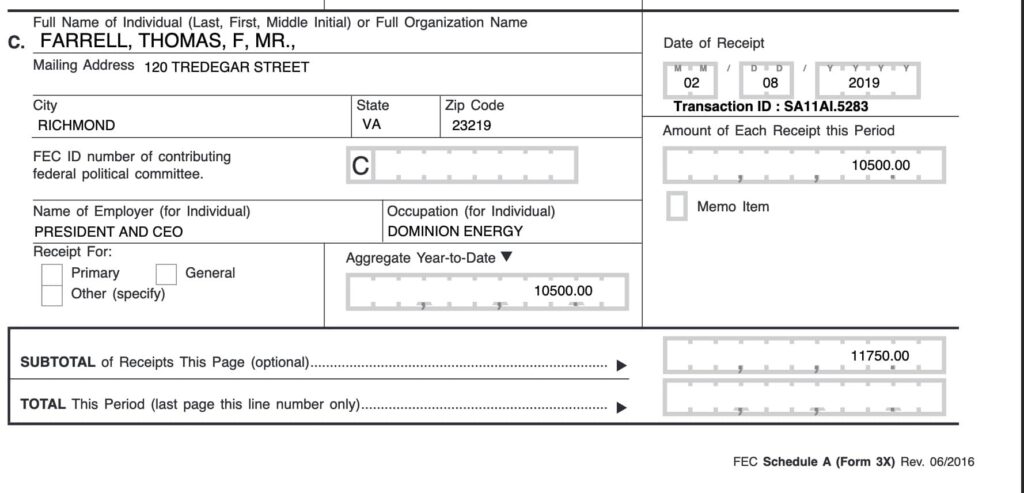
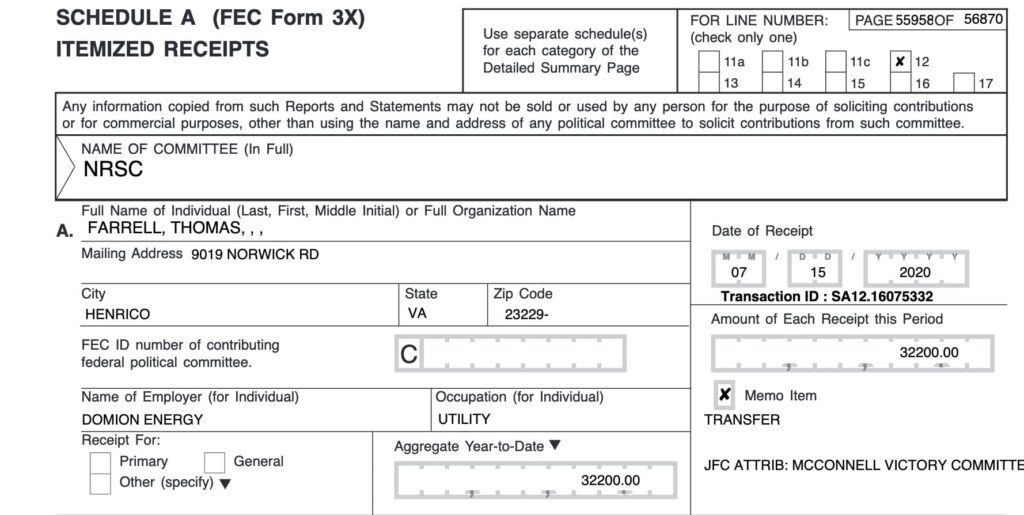
Farrell was compensated a total of $17.2 million last year, and the median of the annual total compensation of Dominion employees was $145,136.
This dataset does not include contributions at the state level, such as Crane’s $35,000 to the Republican Governors Association (RGA) in February 2020. For information about how utility corporations contribute to RGA and other state political organizations, click here to see EPI’s analysis using filings reported to the IRS.
CEO federal contribution data, with FEC direct links: https://docs.google.com/spreadsheets/d/1gbVKXIV79og1AVrQqHigQGL0rjTA3c3cq4Z34DO-mYY/edit?usp=sharing
Utility PAC Contributions to Candidates and Affiliated PACs
Investor-owned utility PACs have contributed a total of $13.7 million this cycle to federal campaigns and PACs working to get candidates elected. Examples of PACs that have received utility PAC contributions include the Blue Dog PAC, which gives money either to Democrats running for House seats or to other PACs and firms supporting Democrats, and the Bluegrass Committee, which is a leadership PAC affiliated with McConnell that spends predominantly to help other Republican senators.
Utility PACs have contributed $7,987,817 to Republicans compared to $5,713,057 to Democrats this election cycle.
As the chart below details, eight utility PACs have made up more than half of all contributions from the sector so far this cycle. Some utilities stand out for ranking high in contributions, but not in megawatt-hours of electricity generated. For instance, Arizona Public Service is the sixth-largest investor-owned utility PAC for political contributions this cycle, but is 19th when ranked by megawatt-hours of electricity. AEP and Xcel are the seventh and ninth-largest power producers, but rank 19th and 16th in PAC contributions, respectively.
These utility PACs also contributed a total of $634,000 to trade association PACs, such as the Edison Electric Institute’s PAC, which in turn gave $375,000 to Republicans and $300,000 to Democrats.
Utility PAC dollars originate from the utility employees themselves and might have bylaws in place that govern how contributions are made. DTE Energy’s political participation policy, for example, states that the company “encourage our employees to become informed about the policy matters affecting DTE Energy and to be involved in the political process. DTE Energy facilitates this participation through the DTE Energy PAC.” It also provides the five criteria used when “evaluating requests for contributions.” Some of the criteria are open to interpretation or vague, such as “public integrity of the candidate,” and “assessment of the appropriate level of support to be provided.”
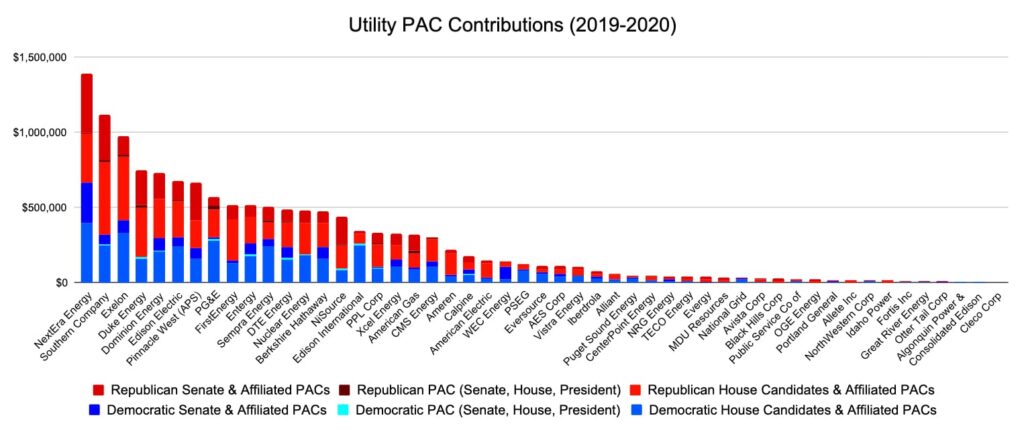
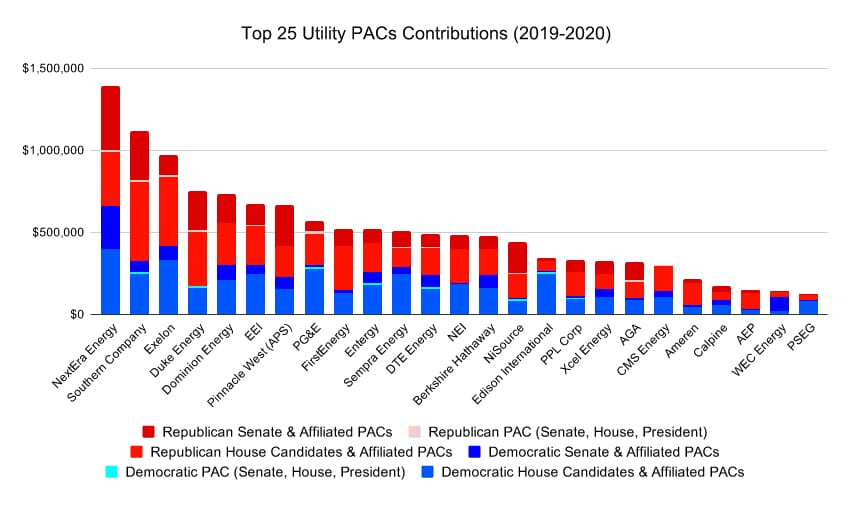
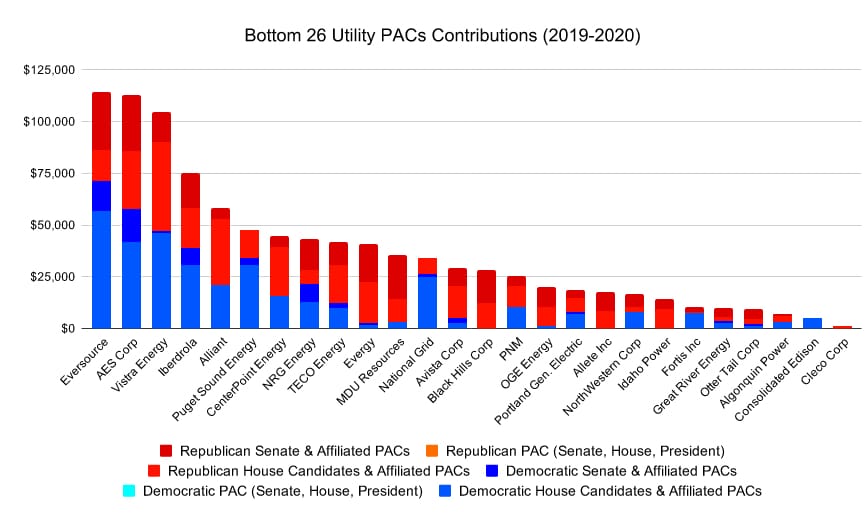
Featured image: U.S. Capitol Building. Photo by U.S. Department of State.



